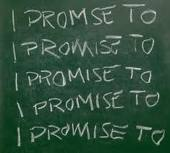Matthew 21:23-32
When I was finalizing my ideas about this sermon, it was Thursday. Thursday night is a particularly challenging night at my house. It is garbage night. I have two sons who still live at home and whose responsibility is to see to it that the garbage and recycling get out to the curb on Thursday night so that it can be picked up early on Friday morning.
This is particularly important because these young adults stay up much later at night that my wife and I, and they sleep in much later than we do. So putting the trash out the night before is a necessity.
This is what the Thursday night scene usually looks like: I get home from some meeting here at church about nine-thirty. The garbage is not at the curb. I go into the house and find one of them on the computer and the other in front of the TV. I say, “are you guys going to take the garbage out?” “Oh yea, Dad,” they say, “just as soon as I am done here. I promise” But with frustrating frequency I get up in the morning, get ready to come here, and as I leave I notice that there aren’t any garbage cans or recycling bins at the curb.
I know that none of you have problems like this, that someone tells you they are going to do something and then doesn’t do it. Maybe it was even me who let you down, I don’t know.
What I do know is that in this parable Jesus is telling about the two sons he is not talking about someone who was so busy they simply couldn’t do it. He wasn’t commenting on any of the possible valid reasons for a disconnect between promise and action. He is simply pointing out that there is a difference between affirming something with your words and affirming something with your actions.
Today is Confirmation Sunday. Most of these students are here because their parents took seriously the promises they made more than a decade and a half ago, to see to it that their children affirmed their baptism.
The reality is that this is not the last time they will do this. No, they will not stand before us again in these white robes and make these promises. In fact, they will now join us, those of us who have said yes to this Jesus, and affirm their baptism over and over and over again.
They will get a chance to do this every time a baby is baptized, every time a worship leader introduces a creed, “let us say these words we believe,” and every time they must respond in faith with the rest of the congregation, speaking words. These words, however, and not the most important way we affirm our faith.
Throughout Matthew’s gospel the phrase, “the will of the Father” is used over and over again. At the very end of the Sermon on the Mount where, in Matthew’s Gospel, the audience is the disciples, Jesus says, “Not everyone who says to me ‘Lord, Lord,” will enter the kingdom of heaven, but those who do the will of my Father in heaven” (Mt. 7:21). When Jesus’ family comes to speak with him, Jesus makes the comment, “Whoever does the will of my Father in heaven is my brother and sister and mother” (12:50). Jesus tells the parable of the Lost Sheep, concluding with this saying: “It is not the will of your Father in heaven that one of these little ones should be lost” (18:14). Jesus is praying in the Garden in Gethsemane, he says to God, “My Father, if this cannot pass unless I drink it, your will be done” (Mt. 26:42).
To live a life of hearing and doing the will of God is to respect and adhere to Jesus’ authority as teacher and Lord. To live a life in which one gives lip service but not life service to his teachings is to disrespect the authority of Jesus.
We reformed folk do live by grace and not by law. And, I freely admit that I am prone to distractions and failure of memory. So, I am thankful for St. Matthew, that this story of the two sons is written down so that I won’t forget what I am supposed to be doing.





Leave a comment
Comments feed for this article